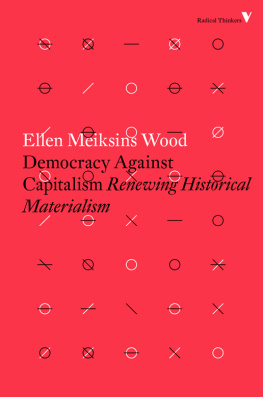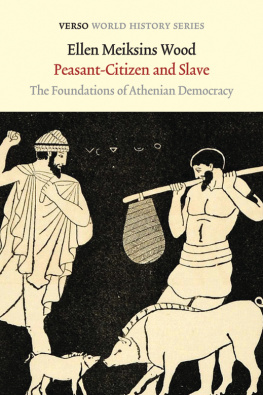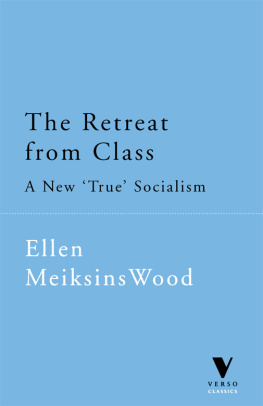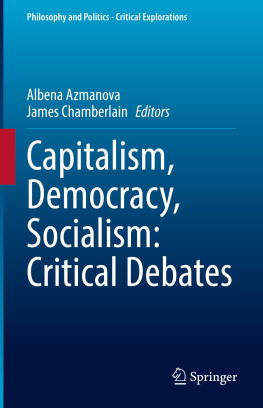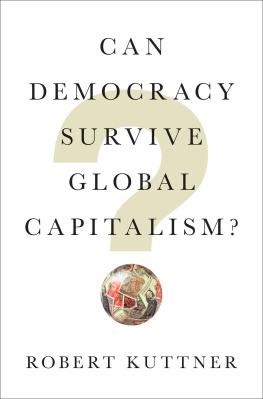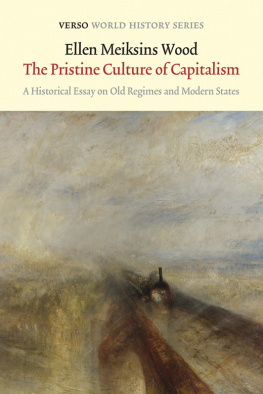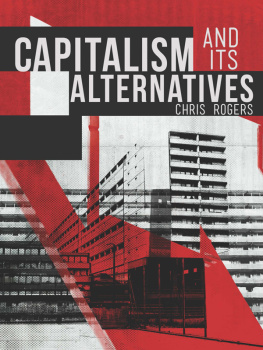This volume is, and is not, a collection of essays. It is a collection in the sense that the volume is in large part based on articles already published or in press, but I hope it is more than merely a collection. This is so both because I have not simply included these essays just as they were but have revised and integrated them, or in some cases only parts of them, and also because I regard them as from the start a coherent body of work. The unifying themes and the ways in which one essay builds upon another will, I think, be more or less self-evident, though in the Introduction there are some general reflections on the dominant themes and their historical context, as well as some comments on what I have done to the essays for the purposes of this volume. Here, I simply wish to thank all the original publishers and the many people who have, in one way or another and at one time or another, helped me with one or more of the chapters.
is based, with some modifications, on my Deutscher Memorial Lecture, originally published as Captialism and Human Emancipation in New Left Review 167 (1988).
Needless to say, these essays owe much to many people. Some have read several essays, some only one, though the extent of my debt to them does not always correspond simply to the number of essays on which they have commented. It hardly needs saying how much I owe to Neal Woods help and support. I am grateful to George Comninel, my former student, now friend and colleague, and to Karen Orren, whose friendship extends back to our early (and long-distant) teens, my brother Peter Meiksins and my father Gregory Meiksins, not only for comments but for many years of discussion, argument and encouragement, not to mention their own exciting work. Frances Abele, David McNally and Colin Mooers, whose critical intelligence as students was an inspiration when I first started writing these essays, have continued to be a great help, now as friends, both in discussion and in their own writings. Other friends who have helped with their critical insights on one or another of the essays are John Saville, Harvey Kaye, Norman Geras and Patrick Camiller. Perry Anderson and Robert Brenner each read three or four of the original essays on which this volume is based, and for several years during which I was thinking and writing on the relevant themes were invaluable resources and interlocutors. Ralph Miliband, whose death as this volume was being copy-edited was a very great loss not only to those who knew him but to the whole of the socialist left, commented on two or three of these essays; but my debt to him goes beyond any specific contribution to my work, since, like many others, I owe a great deal to the example of his firm and lucid socialist commitment.
I also owe thanks to various other people who made useful comments on one or more of the essays: Chris Bertram, Alan Carling, Paul Cartledge, Diane Elson, Peter Euben, Leo Panitch, Bryan Palmer, Nicholas Rogers, and an anonymous reader for Cambridge University Press. My thanks, finally, to John Haslam at CUP for his friendly and efficient guidance through the publication process, and to the copy-editor, Anne Rix, especially for her patience with my last-minute changes.
There is something odd about the assumption that the collapse of Communism represents a terminal crisis for Marxism. One might think, among other things, that in a period of capitalist triumphalism there is more scope than ever for the pursuit of Marxisms principal project, the critique of capitalism.
Yet the critique of capitalism is out of fashion. Capitalist triumphalism on the right is mirrored on the left by a sharp contraction of socialist aspirations. Left intellectuals, if not embracing capitalism as the best of all possible worlds, hope for little more than a space in its interstices and look forward to only the most local and particular resistances. At the very moment when a critical understanding of the capitalist system is most urgently needed, large sections of the intellectual left, instead of developing, enriching and refining the required conceptual instruments, show every sign of discarding them altogether. Post-Marxism has given way to the cult of postmodernism, with its principles of contingency, fragmentation and heterogeneity, its hostility to any notion of totality, system, structure, process and grand narratives. But if this hostility extends to the very idea of capitalism as a social system, this does not prevent these intellectual currents from treating the market as if it were a universal and inevitable law of nature while paradoxically closing off critical access to this totalizing power by denying its systemic unity and insisting on the impossibility of totalizing knowledges. Post-modern fragmentation and contingency here join a strange alliance with the ultimate grand narrative the end of History.
Intellectuals of the left, then, have been trying to define new ways, other than contestation, of relating to capitalism. The typical mode, at best, is to seek out the interstices of capitalism, to make space within it for alternative discourses, activities and identities. Much is made of the fragmentary character of advanced capitalism whether that fragmentation is characterized by the culture of postmodernism or by the political economy of post-Fordism; and this is supposed to multiply the spaces in which a culture of the left can operate. But underlying all of these seems to be a conviction that capitalism is here to stay, at least in any foreseeable historical perspective.
The reformulation of the lefts relation to capitalism as a making of space within it, rather than a direct challenge to and contestation of it, helps, among other things, to explain the major shifts from traditional discourses of the left, such as political economy and history, to the more currently fashionable ones: the study of discourses, texts, and what might be called the culture of identity. If Marxist political economy and history are intended to challenge capitalism as a totality head-on from the vantage point of its antithesis, socialism, cultural studies (conceived in the post-modern way) and other favoured post-left enterprises are defined by the notion that the terrain of politics is within and between the fragments of capitalism, especially in the academy, where discourses and identities can be deconstructed and proliferated without material constraints.

